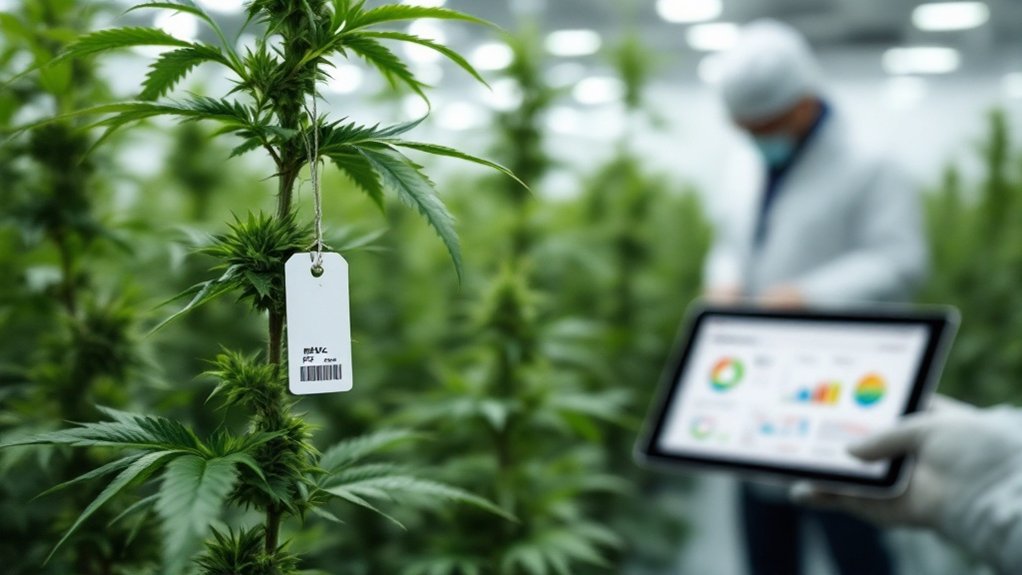Metrc’s API connects cannabis operators’ inventory systems with state compliance infrastructure, eliminating manual data entry requirements. Businesses must obtain API keys through the Metrc interface and work with validated third-party software providers for implementation. The system tracks cannabis from seed to sale using RFID technology, recording plant lifecycle changes, harvest batches, and packaging changes. Proper implementation requires employee registration, completion of training programs, and purchase of Metrc-approved plant and package tags. Understanding state-specific regulations forms the foundation for successful compliance management.
As the cannabis industry continues to evolve under strict regulatory frameworks, Metrc has emerged as the leading compliance tracking system across numerous states. This sophisticated platform, which stands for Marijuana Enforcement Tracking Reporting Compliance, provides end-to-end traceability for cannabis products throughout the entire seed-to-sale pipeline. The system utilizes radio frequency identification (RFID) technology to monitor the weight, location, and transfer of cannabis products via a cloud-based infrastructure specifically designed for state regulatory offices.
Central to Metrc’s functionality is its open application programming interface (API), which creates seamless connections between cannabis operators’ inventory systems and state compliance requirements. This API integration enables cannabis businesses to automate data submission to regulatory agencies without manual entry. The recent improvements to Metrc Connect have enhanced the open API with robust functionality based on industry feedback. To access these integration capabilities, operators must obtain an API key, readily available in the top right corner of the Metrc user interface. The API validates third-party software providers, guaranteeing they can properly interface with all available features for thorough compliance management. Over 5 billion events have been logged in Metrc by cannabis businesses across the United States, demonstrating the system’s widespread adoption.
The Metrc API empowers cannabis businesses to streamline regulatory reporting through automated data submission and verified third-party integrations.
The tracking process begins with plant lifecycle monitoring through Metrc Plant Tags. Initially, cuttings and seedlings are grouped as immature batches, each with assigned plant tags. As plants grow and shift from immature to vegging status based on state-specific size regulations, individual tags follow specific plants through the flowering process. Eventually, plants are grouped into harvest batches before entering the packaging stage.
After harvest, products receive Metrc package tags that may change multiple times before reaching dispensaries. Each tag change must be reported to state regulators through the system. Package tracking utilizes Unique Identifier (UID) codes on tags to facilitate precise monitoring throughout the supply chain, maintaining unbroken chain of custody documentation.
Implementation of Metrc requires specific actions from cannabis operators. All employees must register with the system and complete required training programs. Businesses must purchase plant and package tags directly from Metrc while setting up products and confirming tag assignments in the portal. The recent addition of Metrc Learn provides essential compliance training resources for operators.
Cannabis businesses must understand that each state in the Metrc network maintains different regulations and workflow requirements. Regular synchronization between physical inventory, point-of-sale systems, and Metrc records guarantees ongoing compliance. This meticulous tracking system enables regulatory agencies to maintain oversight while allowing compliant businesses to operate within established legal frameworks.
Frequently Asked Questions
What Are the Costs Associated With Implementing Metrc API?
Implementing the Metrc API involves several costs.
Businesses must pay monthly subscription fees for platform access, and while fees and tagging costs vary from state to state, subscriptions start at about $40.
RFID tagging expenses also differ by state but can cost approximately $0.45 per plant tag and $0.25 per product tag, which can exceed $22,000 for large operations.
Integration and development costs require investment in compatible software solutions and customization of existing systems.
Additional operational compliance expenses average $705 annually, including staff training and potential dedicated personnel for Metrc reporting and reconciliation.
How Long Does Metrc API Integration Typically Take?
Metrc API integration timeframes vary notably depending on several factors.
Most cannabis businesses report integration taking between 4-12 weeks, with complexity determined by the existing software infrastructure, technical expertise of the development team, and specific compliance requirements.
The process typically includes API credential acquisition, endpoint development, thorough testing, and certification.
Custom integrations with complex inventory systems generally require more time than standard point-of-sale connections to the regulatory tracking system.
Can Metrc API Integrate With My Existing POS System?
Metrc can potentially integrate with existing POS systems through its open API, which connects with over 500 different cannabis inventory tracking platforms.
The compatibility depends on whether the POS provider has built an integration with Metrc’s system. Most established cannabis POS systems offer Metrc integration capabilities, either through direct API connections or third-party middleware solutions.
Businesses should verify with their current POS vendor whether they support Metrc’s API, specifically the enhanced Metrc Connect (v2) if available.
Does Metrc Offer Technical Support for API Users?
Metrc provides dedicated technical support specifically for API users. The support team assists with onboarding, integration guidance, and unlimited systems training throughout the implementation process.
API users must complete mandatory training classes before gaining production access, which includes both system usage and technical integration details. Support channels include specialized email assistance and extensive online documentation.
Additionally, third-party integrators like Cannlytics offer supplementary technical support, handling API updates and providing standardized endpoints across Metrc-enabled states.
What Security Protocols Protect Data Transmitted Through Metrc API?
Data transmitted through the Metrc API is protected by multiple security protocols.
All communications occur exclusively over HTTPS with TLS encryption, preventing eavesdropping and tampering during data exchange. Authentication requires license-specific API keys that restrict access to authorized entities.
The system employs immutable ledger technology, maintaining thorough transaction logs for auditability.
Network segmentation, continuous vulnerability assessments, and encrypted RFID tags further secure the data throughout the cannabis supply chain.
This article provides general educational information about cannabis compliance requirements. Specific regulations vary by state and change frequently. Always consult with legal counsel and compliance professionals for guidance on your specific situation and jurisdiction. For more information, check out our Cannabis Compliance Guide.









